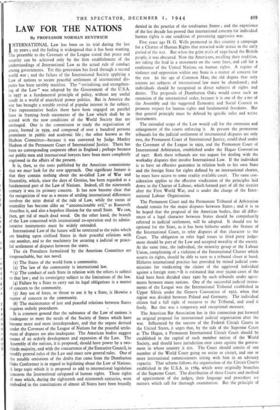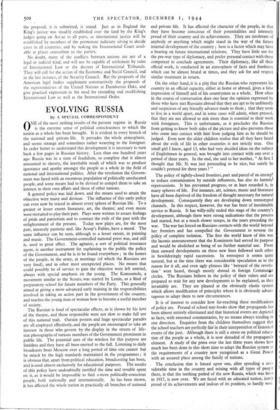LAW FOR THE NATIONS
By PROFESSOR NORMAN BENTWICH NTERNATIONAL Law has been on its trial during the last
25 years ; and the feeling is widespread that it has been wanting. The preamble to the Covenant of the League stated that peace and security can be achieved only by the firm establishment of the understandings of International Law as the actual rule of conduct among governments. Yet this generation has lived through a second world war ; and the failure of the International Society applying a Law of nations to secure peaceful settlement of international dis- putes has been terribly manifest. The " revitalising and strengthen- ing of the Law " was adopted by the Government of the U.S.A. in 1937 as a fundamental principle of policy, without any useful result in a world of anarchical power politics. But in America the war has brought a notable revival of popular interest in the subject. Two representative bodies there have been engaged on parallel lines in framing, fresh statements of the Law which shall be in accord with the new conditions of the World Society that are envisaged. One is the commission to study the organisation of peace, formed in 1939, and composed of over a hundred persons prominent in public and academic life ; the other known as the Hudson Committee—because it was convened by Judge Manley Hudson of the Permanent Court of International Justice. There has been no corresponding corporate effort in England ; perhaps because our public men and international lawyers have been more completely engrossed in the affairs of the present.
It is, then, to the texts published by the American commissions that we must look for the new approach. One significant feature is that they contain nothing about the so-called Law of War and Neutrality, which, since• the days of Grotius, has been regarded as a fundamental part of the Law of Nations. Indeed, till the nineteenth century it was its primary concern. It has now become clear that the recognition of war as a means of settling international differences involves the utter denial of the rule of Law, while the status of neutrality has become alike an " unconscionable evil," as Roosevelt describes it, and also a hopeless illusion for the small State. We can, then, get rid of much dead wood. On the other hand, the branch of the Law concerned with international co-operation and its admin- istrative instruments must be widely extended.
International Law of the future will be restricted to the rules which are binding upon civilised States in their peaceful relations with one another, and to the machinery for securing a judicial or peace- ful settlement of disputes between the states.
The six Postulates formulated by the American Committee are irreproachable, but not novel.
(I) The States of the world form a community.
(2) The law of the community is international law.
*(3) The conduct of each State in relation with the others is subject to that law ; and its sovereignty subject to the limitations of the law.
(4) Failure by a State to carry out its legal obligations is a matter of concern to the community.
(5) Any use of force, or threat to use it by a State, is likewise a matter of concern to the community.
(6) The maintenance of just and peaceful relations between States requires orderly procedures.
It is common ground that the substance of the Law of nations is inadequate to meet the needs of the Society of States which have become more and more interdependent, and that the organs devised under the Covenant of the League of Nations for the peaceful settle- ment of disputes are also inadequate. The American bodies suggest means of an orderly development and expansion of the Law. The Assembly of the nations, it is proposed, should have power by a two- thirds majority, and with the concurrence (Attie Executive Council, to modify general rules of the Law and enact new general rules. One of the notable omissions of the drafts that came from the Dumbarton Oaks Conference is in regard to legislating about the Law of Nations. A large topic which it is proposed to add to international legislation concerns the international safeguard of human rights. Those rights of man which, during the eighteenth and nineteenth centuries, were embodied in the constitutions of almost all States have been brutally
denied in the practice of the totalitarian States ; and the experience of the last decade has proved that international concern for individual human rights is one condition of preventing aggressive war.
Five years ago H. G. Wells promoted in this country a campaign for a Charter of Human Rights that attracted wide notice in the early period of the war. But when the grim tria:s of 1940 faced the British people, it was obscured. Now the Americans, recalling their tradition, are taking the lead in a movement on the same lines, and call for a conference of the United Nations on human rights. A regime of violence and oppression within any State is a matter of concern for the rest In the age of Common Man, the old dogma that only nations are subjects of international law must be abandoned ; and individuals should be recognised as direct subjects of rights and duties. The proposals of Dumbarton Oaks would cover such an extension of the international order, because it is one of the dms of the Assembly and the suggested Economic and Social Council to promote respect for human rights and fundamental freedoms. But that general principle must be defined by specific rules and active instruments.
The extended scope of the Law would call for the extension and enlargement _of the courts enforcing it. At present the permanent tribunals for the judicial settlement of international disputes are only two, the Permanent Court of International Justice, establ:shed under the Covenant of the League in 1920, and the Permanent Court of International Arbitration, established under the Hague Convention of 1907. Both these tribunals are too august for dealing with the workaday disputes that involve International Law. If the individual is to have an effective guarantee in relation both to his own State and the foreign State for rights defined by an international charter, he must have access to some readiiy available court. The same con- sideration applies to the effective vindication of the principles laid down in the Charter of Labour, which formed part of all the treaties after the First World War, and is under the charge of the Inter- national Labour Organisation.
The Permanent Court and the Permanent Tribunal of Arbitration should remain for the major disputes between States ; gnd it is to be hoped that the proposal of the American bodies, that all differ- ences of a legal character between States should be compulsorily referred to judicial settlement, will be adopted. It should not be optional for the State, as it has been hitherto under the Statute of the International Court, to refer disputes of that character to the Court. The obligation to refer legal issues to third party judge- ment should be part of the Law and accepted morality of the society. At the same time, the individual, the minority group or the Labour Union, complaining of a violation of the International Charter which asserts its rights, should be able to turn to a tribunal closer at hand. Hitherto international practice has provided by mixed judicial com- missions for vindicating the claims of the aggrieved individual against a foreign state.—It is estimated that over 50,00o cases of the kind have been decided since 1920 by such tribunals under agree- ments between many nations. One of the successful judicial instru- ments of the League was the International Tribunal established in Upper Silesia under the Geneva Convention of 1922, when that region was divided between Poland and Germany. The individual citizen had a full right of recourse to the Tribunal, and used it freely. But that was a temporary and exceptional measure.
The American Bar Association has in this connection put forward an original proposal for international judicial organisation after the war. Influenced by the success of the Federal Circuit Courts in the United States, it urges that, by the side of the Supreme Court at The Hague, a Permanent International Circuit Court should be established in the capital of each member nation of the World Society, and should have jurisdiction over cases against the govern- ment in whose country it sits. The Court should consist of one member of the World Court going on assize or circuit, and one or more international commissioners sitting with him in an advisory capacity. That scheme follows the organisation of the Circuit Courts established in the U.S.A. in 1789, which were originally branches of the Supreme Court. The distribution of these Courts and method of appointment of the judges, their language and procedure are matters which call for thorough examination. But the principle of
the proposal, it is submitted, is sound. Just as in England the King's justice' was steadily established over the land by the King's judges going on Assize to all parts, so international justice will be established by members of the permanent judiciary sitting to decide cases in all countries, and by making the International Court avail- able at places convenient to the parties.
No doubt, many of the conflicts between nations are not of • a legal or judicial kind, and will not be capable of settlement by rules of International Law or the decrees of International Tribunals. They will call for the action of the Economic and Social Council, and in the last instance, of the Security Council. But the proposals of the American legal bodies supplement constructively the proposals of the representatives of the United Nations at Dumbarton Oaks, and give practical expression to the need for extending and establishing International Law as well as the International Order.



























 Previous page
Previous page